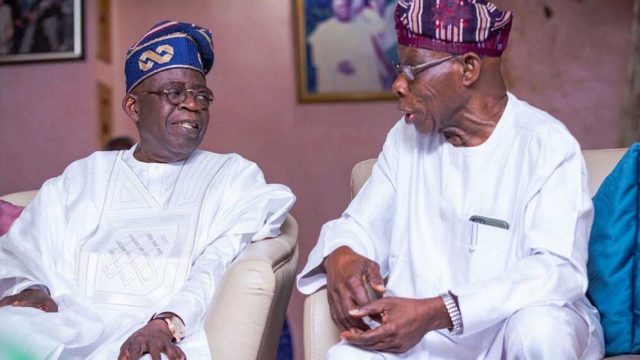
Former President Olusegun Obasanjo has criticised President Bola Tinubu’s policies on fuel subsidy removal and exchange rates as necessary but “wrongly implemented.”
Obasanjo’s remarks come as Tinubu’s government marks its first anniversary in office.
A statement issued by his media aide, Kehinde Akinyemi, on Sunday, revealed that Obasanjo made the statement during a colloquium titled “Nigeria’s Development: Navigating the Way Out of the Current Economic Crisis and Insecurity” at the Paul Aje Colloquium (PAC) in Abuja.
Obasanjo pinpointed three major decisions of the current administration: fuel subsidy removal, exchange rate adjustments, and handling the military coup in Niger Republic, noting that the Federal Government’s approach has dampened investors confidence.
“Today, the government has taken three decisions, two of which are necessary but wrongly implemented and have led to the impoverisation of the economy and of Nigerians. These are the removal of subsidy, closing the gap between the black market and official rates of exchange and the third is dealing with a military coup in Niger Republic,” he said.
“The way forward is production and productivity which belief and trust in government leadership will engender. No shortcut to economic progress but hard work and sweat.”
The former president also criticised those opposing his stance on the refurbished refinery in Port Harcourt, Rivers State, labelling them as “sycophants and spin doctors.”
He stressed that his decision to partially privatise the refineries in 2007 was based on a thorough study, demonstrating his understanding of the situation.
Reflecting on President Tinubu’s first year in office, Obasanjo proposed solutions to Nigeria’s current issues, including a 25-year development agenda.
Obasanjo further warned that the international community look at Nigeria with scepticism, stressing that leaders have to start presenting the country in a way that “we will be taken seriously.”
He said, “The economy does not obey orders, not even military orders. I know that. If we get it right, in two years, we will begin to see the light beyond the tunnel. It requires a change of characteristics, attributes, and attitudes by the leadership at all levels to gain the confidence and trust of investors who have alternatives,” adding that “Total Energy has gone to invest $6 billion in Angola instead of Nigeria. If the truth must be stated, the present administration has not found the right way to handle the economy to engender confidence and trust for investors to start trooping in.
“They know us more than we know ourselves. And now they are laughing at us, not taking us seriously. We have to present ourselves in such a way that we will be taken seriously. If the existing investors are disinvesting and going out of our country, how do we persuade new investors to rush in? We can be serious if we choose to be but we need to change from transactional leadership in government to transformational and genuine servant leadership.
“With change by us, the investors will give us the benefit of the doubt, and security will be taken care of on a sustainable long-term basis, they will start to test the water. With the right economic policies, attribute of integrity, and honesty of purpose, all should be well with all hands on deck and the government becomes a catalyst for development, growth, and progress.”
He stressed the importance of consistency in policy, stating, “Tinkering with the exchange rate is not the answer. The answer is consistency and continuity in policy to ensure stability and predictability. That way, we will be sure of incentivizing domestic and foreign investment.
“There must be honesty and transparency in government dealings and contracts and not lying with deception about these issues. When the government is seen as pursuing the right policy, the private sector will go for production and productivity. Change is possible but it must begin with the leadership”.
Obasanjo’s comments on the refinery issue come six months after claims that the refinery would begin operation in January. He urged the government and the governed to reflect on the past and present, asking, “How did we get here?” He stressed the need for a multi-faceted approach to address the root causes of Nigeria’s challenges.
“Looking at the topic of today’s occasion, the question I would ask is, how do we navigate our way out of these crises and pave the path towards a more secure and prosperous Nigeria? I believe the answer to this requires a multi-faceted approach that addresses the root causes of these challenges,” he said.
“The central questions are: where were we? And how did we get to where we are today?”
Continuing he said, “Firstly, we must know where we are coming from. Our economy has consistently suffered from poor policies, lack of long-term sustainable policies, discontinuity, adhocry, and corruption firmed on personal greed, avarice, incompetence, lack of knowledge and understanding, and lack of patriotism.
“For instance, the statement and proposed actions given forty-five years ago to stop fuel scarcity are the same statement and action being touted today. I recall when I made the statement that the refineries would not work, the sycophants and spin doctors of this current administration went out to castigate me as not being a petroleum engineer and that I did not know what I was talking about.
“They forgot that the attempt that was made in 2007 to partly privatise the refineries was made by me after a thorough study of the situation. But the decision was reversed by my successor and the 750 million dollars paid was refunded.”



